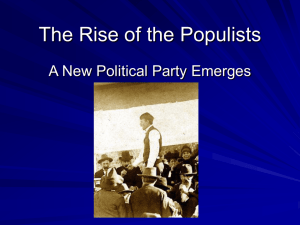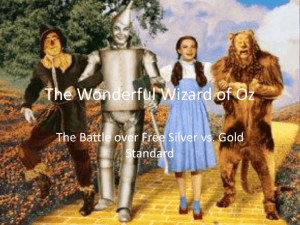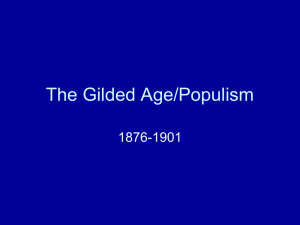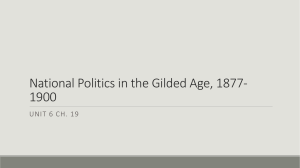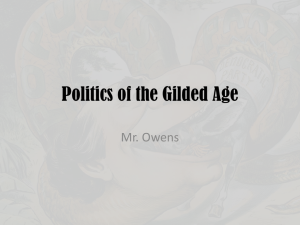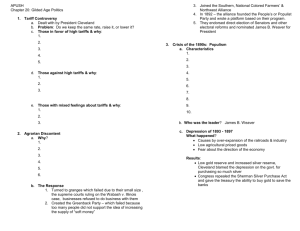Four.GildedAge.doc
advertisement
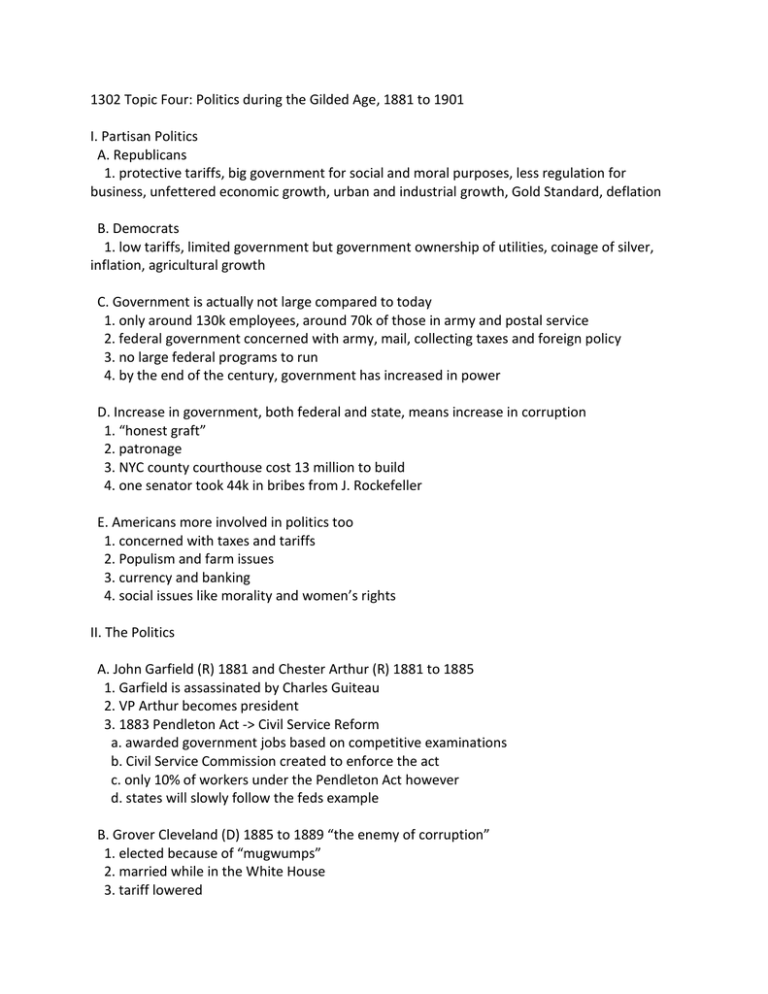
1302 Topic Four: Politics during the Gilded Age, 1881 to 1901 I. Partisan Politics A. Republicans 1. protective tariffs, big government for social and moral purposes, less regulation for business, unfettered economic growth, urban and industrial growth, Gold Standard, deflation B. Democrats 1. low tariffs, limited government but government ownership of utilities, coinage of silver, inflation, agricultural growth C. Government is actually not large compared to today 1. only around 130k employees, around 70k of those in army and postal service 2. federal government concerned with army, mail, collecting taxes and foreign policy 3. no large federal programs to run 4. by the end of the century, government has increased in power D. Increase in government, both federal and state, means increase in corruption 1. “honest graft” 2. patronage 3. NYC county courthouse cost 13 million to build 4. one senator took 44k in bribes from J. Rockefeller E. Americans more involved in politics too 1. concerned with taxes and tariffs 2. Populism and farm issues 3. currency and banking 4. social issues like morality and women’s rights II. The Politics A. John Garfield (R) 1881 and Chester Arthur (R) 1881 to 1885 1. Garfield is assassinated by Charles Guiteau 2. VP Arthur becomes president 3. 1883 Pendleton Act -> Civil Service Reform a. awarded government jobs based on competitive examinations b. Civil Service Commission created to enforce the act c. only 10% of workers under the Pendleton Act however d. states will slowly follow the feds example B. Grover Cleveland (D) 1885 to 1889 “the enemy of corruption” 1. elected because of “mugwumps” 2. married while in the White House 3. tariff lowered 4. 1887 Interstate Commerce Act a. creates the Interstate Commerce Commission, first government regulatory agency b. only for railroads c. had to charge reasonable rates d. had to charge same rates 5. Department of Labor created 6. Department of Agriculture 7. loses election of 1888 to Benjamin Harrison even though he wins the popular vote (Jeopardy Moment: Baby Ruth candy bar named after Ruth Cleveland, who is born while her father is president.) C. Benjamin Harrison (R) 1889 to 1893 and the Billion Dollar Congress 1. wins the electoral vote while Cleveland wins the popular vote 2. McKinley Tariff, raises tariffs rates a. not really needed, Europe couldn’t complete with American industry anyway 4. Pension Act for Civil War veterans and widows 5. Sherman Anti-Trust Act 1890 a. any combination in restraint of trade is illegal, used to stop labor unions really 6. Sherman Silver Purchase Act a. government buys 4 million oz. of silver per month b. prints paper money to pay, but keeps silver out of circulation D. The Farm, The Silver Issue and Populism 1. Farm Issues a. technology increased production, prices drop b. deflationary currency equals high interest rates means more debt c. no longer farm to market, operating in a different economy d. many farmers are tenant farmers e. more industrial farms f. most agricultural products sold overseas, didn’t understand foreign export markets 2. Farm incomes decline while costs increase 3. The Silver Issue a. William Hope Harvey and Coin’s Financial School b. In 1873, silver taken out of circulation, the “crime of 1873” c. can look at it as urban/industrial vs. rural/agricultural (or the Civil War all over again) 4. Populism a. at first farmers band together into coalitions like the Grangers to form cooperatives b. then they became a third party political force and as Mary Lease said farmers should “raise less corn and raise more hell”. c. want redistribution of wealth through graduated income tax d. want government control of utilities, banking and railroads e. endorsed labor unions and women’s sufferage f. wanted direct election of senators g. wanted MORE government regulation 5. But, did not really favor civil rights a. Populist party did make gains at the state level, but never made it as a national party b. Populism fades by 1896, but it’s goals will be taken up by the Progressives E. Grover Cleveland (D) 1893-1897 1. Cleveland is elected again in 1892, however, a depression starts soon after his inauguration in 1893. 2. The Panic of 1893 starts when two major businesses declare bankruptcy. a. depreciated currency because of the Sherman Silver Purchase Act. b. up to 25% unemployment c. gold reserves fell d. huge labor strikes (Pullman Strike, Homestead Strike) 3. Cleveland has Congress repeal the Sherman Silver Act, but doesn’t help 4. More women have to enter the work force 5. Realism in literature, Mark Twain, Theodore Dreiser F. The Presidential Election of 1896 1. William Jennings Bryan, the Whistlestop Campaign and the Cross of Gold Speech a. Bryan travels the country on a locomotive to campaign, new innovation b. he supports “free silver”, “shall we crucify mankind on a cross of gold”? c. evokes an image of an older America, where farm values were still respected 2. William McKinley stays put, but he is better funded a. can send people out after Bryan to refute his charges b. McKinley wins the urban vote and wins the election 3. also, Populist split the Democratic vote and help McKinley 4. after 1896, the Populist is not a viable political force in the nation G. William McKinley (R) 1897 to 1901 1. Fortunately for him, gold is discovered in Alaska and Australia 2. economy improves 3. attention turns to foreign affairs 4. first president since Grant to be re-elected
